Contents A dictionary tells you what a word means and how to spell it. The words in a dictionary are listed in alphabetical order. How to find a word Think of the first letter in the word you want to look up. Once you know this, there is more than one way to find your word in the dictionary: You can use the at the back of the ebook which lists all of the dictionary words in alphabetical order. Scroll through the Index until you find the letter your word begins with, then look down the words until you find the one you are looking for. You can then follow the link to the entry in the dictionary.
You can use the page at the front of the book, which has a link to every letter in the dictionary. Follow the link to the letter your word begins with, then look through the entries in this letter until you find the word you are looking for. Finding out about a word 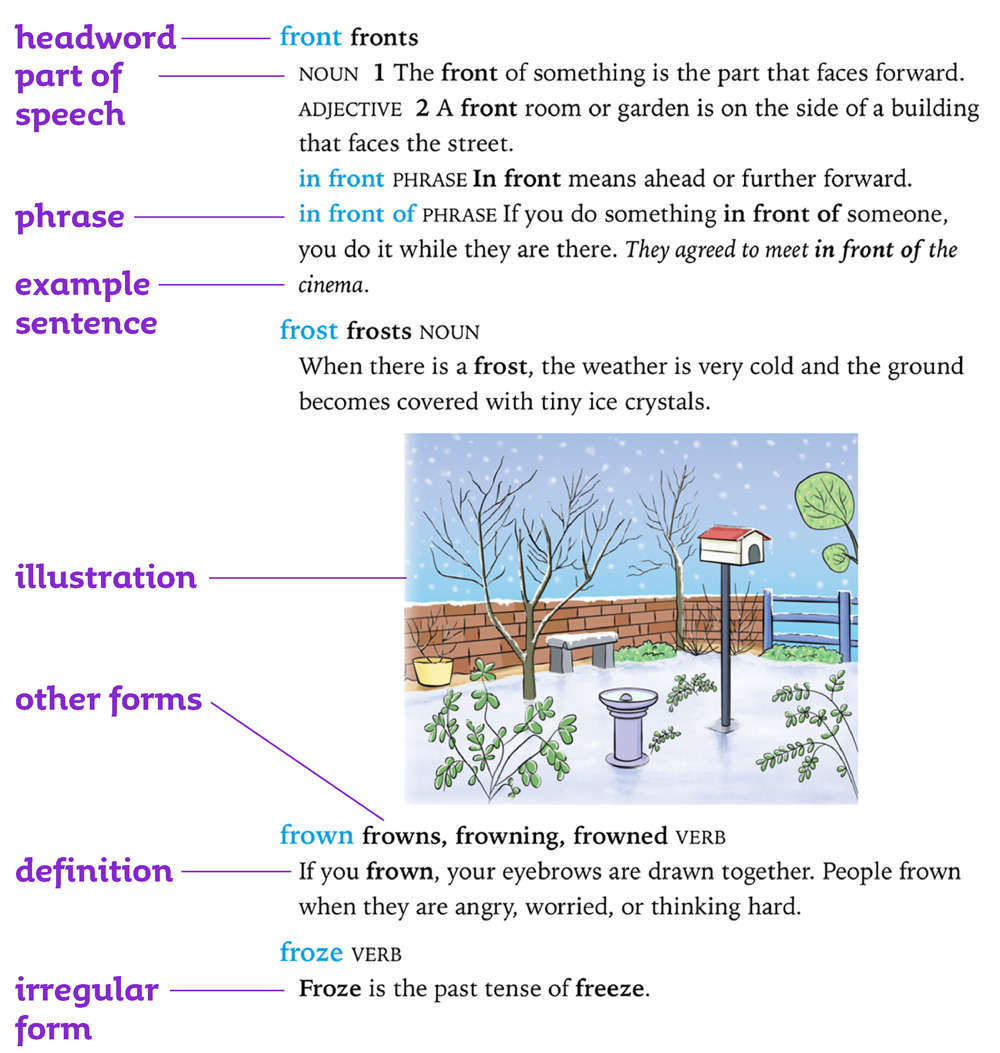 The headword is the word you are looking up. On the same line as the headword, you will see how to spell other forms of the word, such as plural nouns, verb tenses or other adjective forms, called comparatives and superlatives. Next you will see the part of speech . This tells you what type of word the headword is, such as a noun, verb, adjective, adverb or pronoun.
The headword is the word you are looking up. On the same line as the headword, you will see how to spell other forms of the word, such as plural nouns, verb tenses or other adjective forms, called comparatives and superlatives. Next you will see the part of speech . This tells you what type of word the headword is, such as a noun, verb, adjective, adverb or pronoun.
After the part of speech, you will find the definition . The definition tells you what the word means. The definitions are numbered if there is more than one. Each definition has its own part of speech. Some words have an example sentence in italics . This shows you how the word might be used in speech or writing.
Some words have a photo or other illustration to help you read the word and understand its meaning. A phrase may also be included. Under the word front , you will also find the definition of the phrases in front and in front of . An irregular form of a word is a plural noun or verb tense which does not follow the usual spelling rules. You can find many irregular forms in this dictionary. Other dictionary features Pronunciation is how you say a word.
Some words can be spelled the same, but sound different and mean different things these words are called homographs. This dictionary gives you pronunciation help for some words, including homographs. For example: tear tears, tearing, tore, torn ( rhym es with fear ) NOUN Tears are the drops of liquid that come out of your eyes when you cry. ( rhymes with fair ) VERB If you tear something, such as paper or fabric, you pull it apart. Some definitions include a label , such as FORMAL , INFORMAL or TRADEMARK . This tells you a little more about the word or how it is used: Rollerblade Rollerblades
NOUN ; TRADEMARK Rollerblades are roller skates which have the wheels set in one straight line on the bottom of the boot.
Related words are given at the end of some entries, with their parts of speech. These tell you other forms of the word, such as the noun or adverb form. For example: blur blurs NOUN A blur is a shape that you cannot see clearly. The car went past so fast it was just a blur . blurred ADJECTIVE blurry ADJECTIVE Some definitions tell you where to look for more information , such as another headword, or the pages at the back of the dictionary. are VERB Are is a present tense form of be .
They are both in my class. See Collins Word Wizard gives you extra help with vocabulary, grammar and spelling. It has pages to help you understand parts of speech, punctuation, and prefixes and suffixes, as well as handy hints for learning tricky spellings. Look out for the themed picture pages and games to play with the dictionary. Online resources Explore further at www.collins.co.uk/homeworkhelp for games, activities and extra support for parents and children. a or an ADJECTIVE A and an are used when you talk about one of something.
A is used when the next sound is a consonant; an is used when the next sound is a vowel (a, e, i, o or u). a car an apple abandon abandons, abandoning, abandoned VERB If you abandon something, you leave it and do not return. The cub had been abandoned by its mother. VERB If you abandon a piece of work, you stop doing it before it is finished. abbreviation abbreviations NOUN An abbreviation is a short form of a word or phrase. ability abilities NOUN If you have the ability to do something, you are able to do it. able abler, ablest ADJECTIVE If you are able to do something, you can do it. aboard PREPOSITION If you are aboard a ship or plane, you are on or in it. about ADVERB You say about in front of a number to show it is not exact. about ADVERB You say about in front of a number to show it is not exact.
Ill be home at about five oclock. PREPOSITION If you talk or write about something, you say things to do with that subject. He is talking about boats. above PREPOSITION If something is above something else, it is over it, or higher up. He held the ball above his head. absent ADJECTIVE If someone is absent , they are not here. absolutely ADVERB You can use absolutely to make what you are saying sound stronger. absolutely ADVERB You can use absolutely to make what you are saying sound stronger.
You must stay absolutely still. absorb absorbs, absorbing, absorbed VERB If something absorbs a liquid, it soaks it up or takes it in. absurd ADJECTIVE Something that is absurd seems silly, because it is quite different from what you would expect. Its absurd to wear your jumper in this heat. abuse NOUN Abuse is cruel treatment of someone. accept accepts, accepting, accepted VERB If you accept something you have been offered, you say yes to it. accident accidents NOUN An accident is something nasty that happens by chance. accident accidents NOUN An accident is something nasty that happens by chance.
He broke his leg in a climbing accident . accidentally ADVERB account accounts NOUN An account is something written or spoken that tells you what has happened. NOUN An account is also money that you keep at a bank. accurate ADJECTIVE An accurate measurement or description is exactly right. ache aches NOUN An ache is a dull, lasting pain. achievement NOUN acid acids NOUN Some acids give food a sharp, sour taste. achievement NOUN acid acids NOUN Some acids give food a sharp, sour taste.
Lemons and vinegar contain acid. Strong acid can burn your skin. acid rain NOUN Acid rain is rain that is mixed with dirty gases in the air. It can damage buildings, trees and fish. acrobat acrobats NOUN An acrobat is someone who does difficult and exciting tricks, like balancing on a high wire. act acts, acting, acted VERB When you act , you do something. act acts, acting, acted VERB When you act , you do something.
He had to act quickly to put out the fire. VERB If you act in a play or film, you have a part in it. NOUN An act is something that you do. action actions NOUN An action is a movement of part of your body. active ADJECTIVE Someone who is active moves about a lot, or is very busy. ADJECTIVE In grammar, a verb in the active voice is one where the subject does the action, rather than having it done to them.
See activity activities NOUN Activity is when there are a lot of things happening. actor actors NOUN An actor is a man or woman whose job is to act in plays or films. actress actresses NOUN A female actor is sometimes called an actress . See actual ADJECTIVE You describe something as actual when you mean it is real. The shop said the paint was red, but the actual colour was pink. actually ADVERB adapt adapts, adapting, adapted VERB If you adapt to something new, you change in some way that helps you.
VERB If you adapt something, you change it to suit your needs. The book was adapted to make a film. adaptable ADJECTIVE Someone who is adaptable can change to deal with new situations. add adds, adding, added VERB If you add something, you put it with whatever you have already. Put flour in the bowl and add an egg. VERB If you add numbers of things together, you find out how many you have.


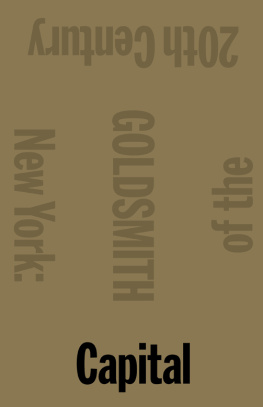
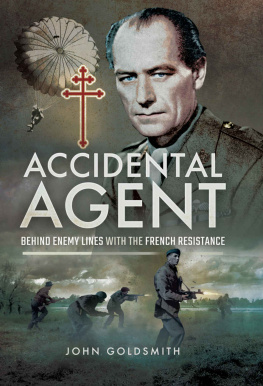

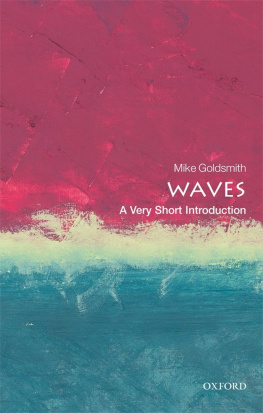

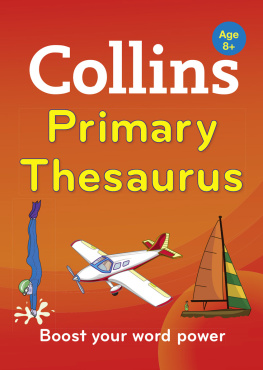
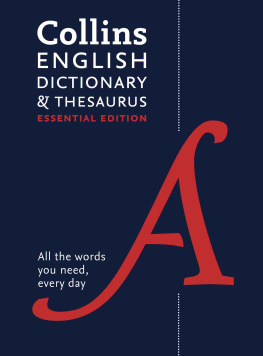

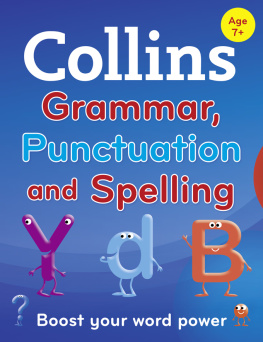
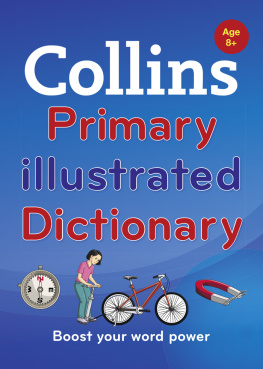
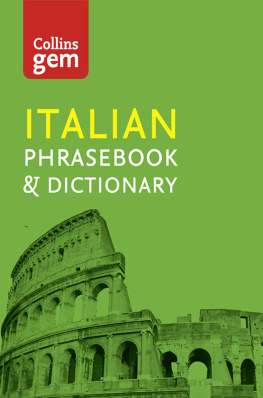
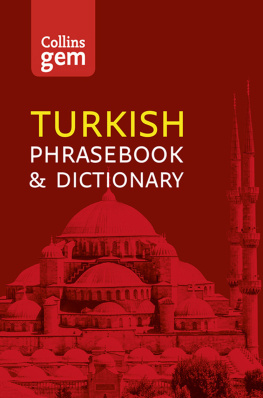
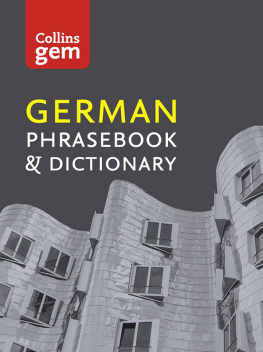
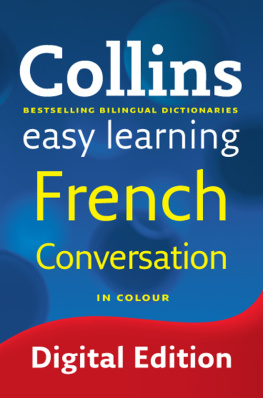


 The headword is the word you are looking up. On the same line as the headword, you will see how to spell other forms of the word, such as plural nouns, verb tenses or other adjective forms, called comparatives and superlatives. Next you will see the part of speech . This tells you what type of word the headword is, such as a noun, verb, adjective, adverb or pronoun.
The headword is the word you are looking up. On the same line as the headword, you will see how to spell other forms of the word, such as plural nouns, verb tenses or other adjective forms, called comparatives and superlatives. Next you will see the part of speech . This tells you what type of word the headword is, such as a noun, verb, adjective, adverb or pronoun.